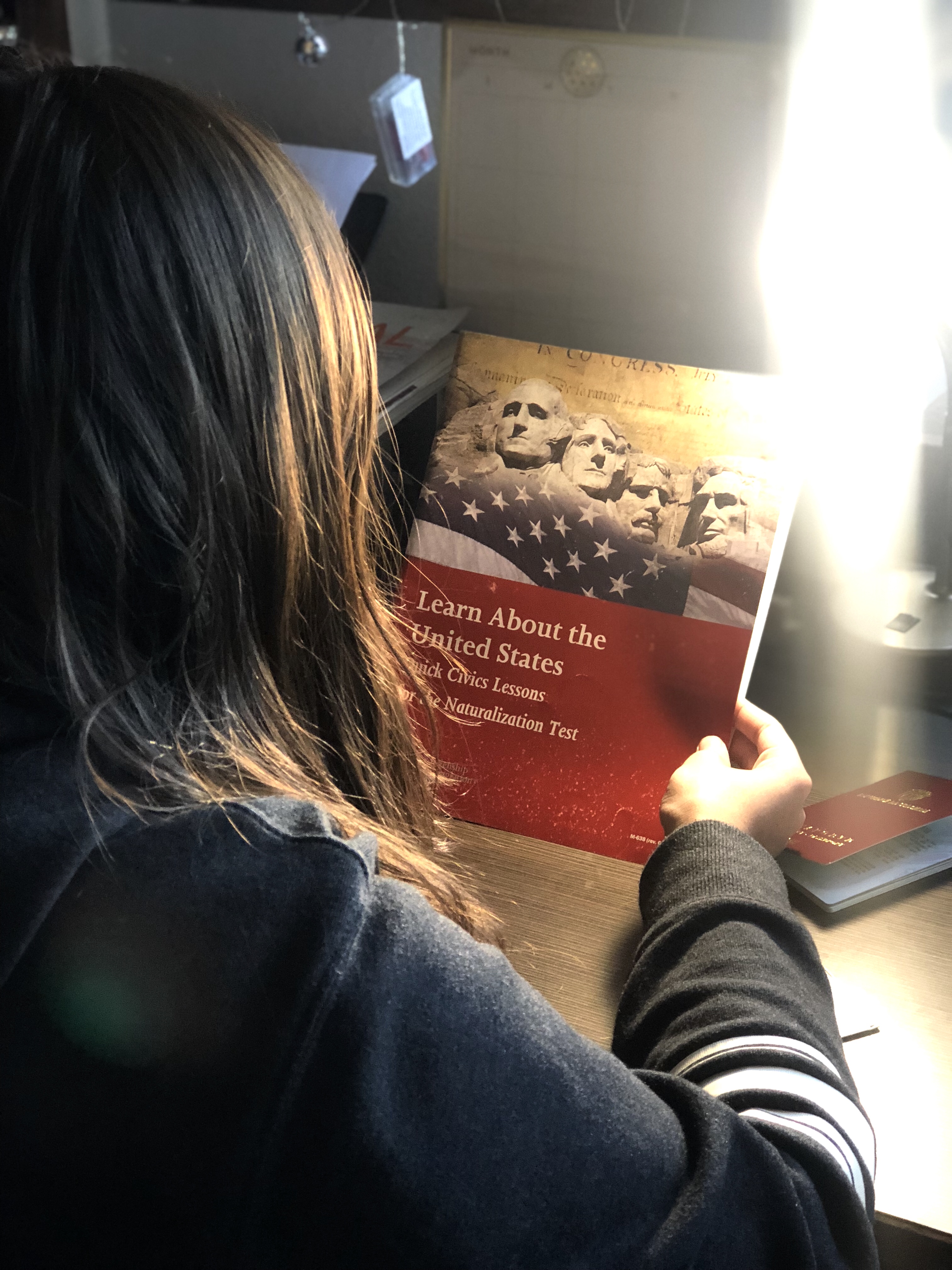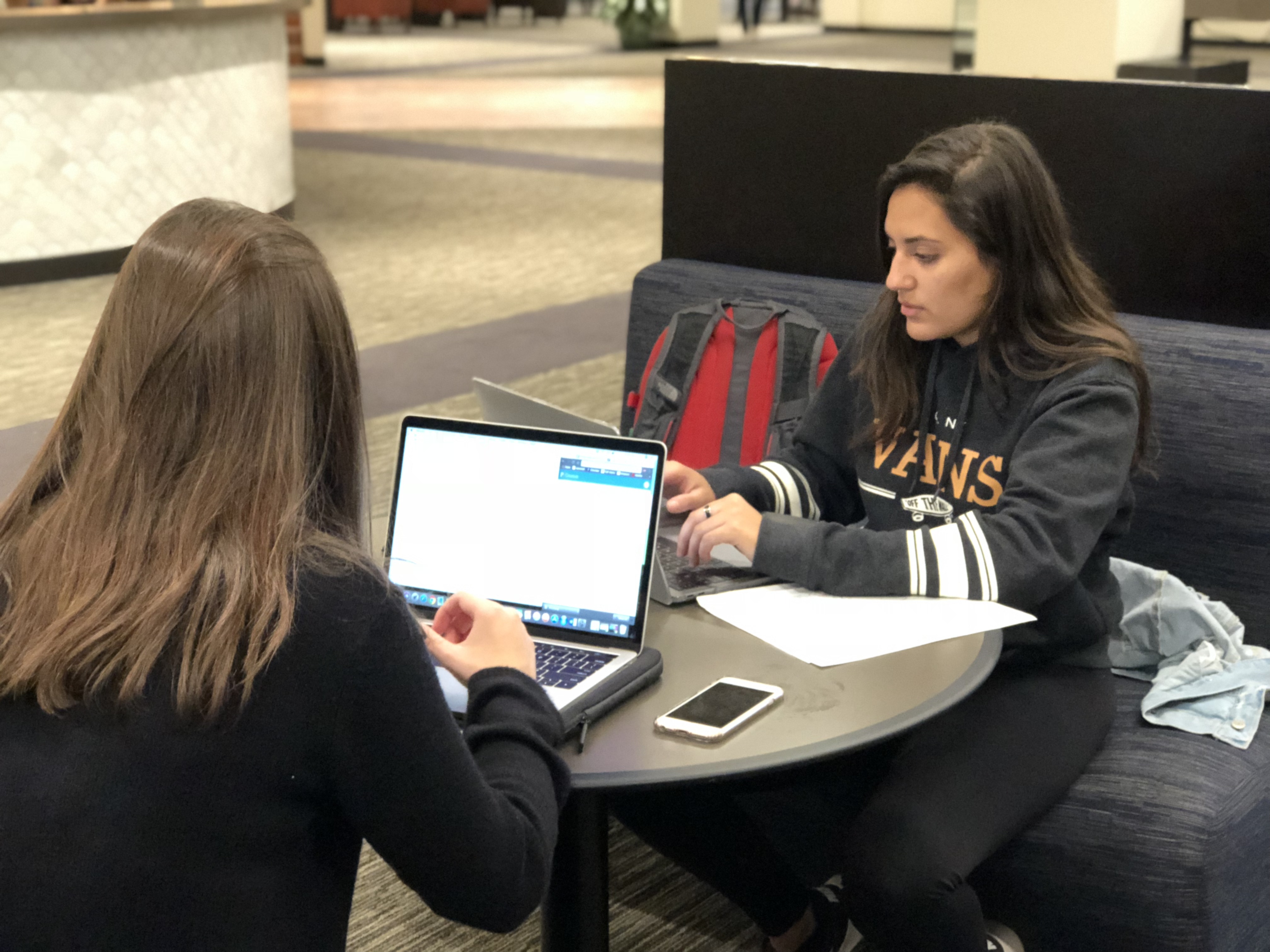
Fear.
Fear of the unknown. Fear of speaking out.
These are just a couple of the anxieties that Pepperdine students who are non-U.S. citizens face with the every-changing immigration policies.
Under his presidency, Donald Trump has worked to shift the U.S.’s present immigration structure of “family reunification and employment-based migration” toward “a point-based system that prioritizes the admission of immigrants with certain education and employment qualifications,” Jens Manuel Krogstad and Ana Gonzalez-Barrera wrote in a Feb. 26 Pew Research Center piece. Under such reforms, immigration officers are cracking down on undocumented immigrants and the fate of Deferred Action for Childhood Arrivals (DACA) recipients is full of uncertainty.
“The not knowing,” said Paula Pamplona, a first-year computer science and mathematics major. “That’s the worst thing of it all. I am scared for my dad because at any time he can be deported and then I wouldn’t know what to do.”
Pamplona is just one of the many students who face the daily stresses of uncertainty. While Pepperdine has taken steps to guide students, individuals like Pamplona said more could be done.
Changes to immigration policies
Trump announced in September 2017 that he would end the Obama administration’s DACA program March 5 unless Congress enacted legislation, which they have so far failed to do. However, federal courts in California and New York issued nationwide injunctions on ending the program and the Supreme Court refused to review the case, Robert Barnes wrote in a Feb. 28 Washington Post piece. DACA remains in limbo.
While Trump wants a point-based immigration system, states such as California are reluctant to submit to such changes. This dissention led the Trump administration to file a lawsuit March 6 against the state’s alleged sanctuary laws, Katie Benner and Jennifer Medina wrote in a March 6 New York Times article.
California sanctuary policy advocates, such as Gov. Jerry Brown and State Attorney General Xavier Becerra, are up against Trump and Attorney General Jeff Sessions to keep family unification policies in place. Meanwhile, numerous Pepperdine students, as well as their friends and family, are facing the repercussions of the changing immigration climate and deportation scares.
The students’ struggles

Pepp Post reached out to some 15 students known to be immigrants but only Pamplona was willing to speak on behalf of the daily struggles she faces being a non-U.S. citizen. As a permanent resident, Pamplona said she was more than willing to share her story in hopes that others would speak out.
At 5-years-old, Pamplona packed a single suitcase containing a few articles of clothing and left the familiarity of Bogotá, Columbia, and most of her belongings for a land 1,697 miles away: Tampa, Florida.
At 9-years-old, Pamplona moved to Franklin, Tennessee, where she ultimately adjusted to the American way of life.
“It was much easier for me to adjust because I was so young,” Pamplona said. “Around that age you’re still learning everything so I was able to pick up English quickly. It was difficult for my parents — my mom specifically — because she’s not as advanced in English as the rest of us so it’s harder for her to get a job or advance in her job.”
While Pamplona’s mother, older sister and brother are U.S. citizens, Pamplona said she and her father are in the process of earning their citizenship. They have taken all of the steps to become U.S. citizens but their process has been anything but smooth.
“When we moved here we were referred to this lady who was supposed to do all of our legal documents,” Pamplona said. “It turned out all of it was a fraud and we didn’t find out until nine years later. The lady ended up going to jail for five years because she did it to a bunch of other immigrants.”
Pamplona has since filled out the application for citizenship, visited the Consulate of Colombia to obtain an American passport, taken the biometrics test and studied for the citizenship interview and test. While Pamplona has followed all procedures, she has waited nine months so far to take her citizenship test.
“It sucks that it’s taking so long to get my citizenship because it makes it harder for me to travel when other people can travel way easier,” Pamplona said. “I’m also studying in Germany next year and I don’t want that to be jeopardized since it’s taking so long.”
Pamplona said that while her father is also in the process of acquiring his citizenship, he is also experiencing daily deportations fears because he hasn’t yet received permanent resident documents, which puts added stress on Pamplona.
A Pepp Post survey of 52 students, including U.S. citizens and non-U.S. citizens, found that five fear deportation, while 12 know someone who has been deported.
Pepperdine offers legal help, mentoring and formal counseling for students seeking to learn more about the changing immigration policies, faculty said. However, students such as Pamplona have either felt no need to use the resources or did not even know of their existence.
“I’m not really sure what Pepperdine does for international or non-U.S. citizens,” Pamplona said. “I haven’t really felt the need for their help but I think Pepperdine should provide more tutoring or help in integrating international or immigrant students.”
What Pepperdine has to offer
Pepperdine President Andrew K. Benton delivered a university-wide statement in February 2017 that addressed the country’s changing immigration policies and Pepperdine’s goal of inclusiveness and protection for all students, Alexa Brown wrote in a Feb. 2 Pepperdine Law Surf Report.
Some outlets for students include the Office of International Students, the Pepperdine Law Immigration Clinic, the Counseling Center and Intercultural Affairs. All information brought to any of these departments will remain confidential, said Dan Rodriguez, divisional dean of Religion and Philosophy and a professor of religion and Hispanic Studies. The university also doesn’t ask its students their residency status.
Rodriguez said he believes it is a Christian imperative for the university to care for all of its population, regardless of a person’s residency status.
“We should care about immigrants because God loves immigrants and has always challenged his people to demonstrate the same love, compassion and justice toward immigrants that he demonstrated towards us,” Rodriguez wrote in an email, citing several verses in Deuteronomy 24 concerning wages, justice and social welfare, and Leviticus 19 concerning oppression. “As Christians we too are immigrants, our true homeland is in heaven. … Here, we are to embrace our identity as a colony of resident aliens.”
Brooke Cutler, director of the Office of International Student Services, is an active member of the International Advisory Council who works alongside the institution’s General Council. Cutler said her office is a safe place for all students, especially those with F1 student visas.
Cutler said she understands that several international students experience added stress than the average student, for they fear for the unknown. For example, international students must adhere to regulations that accompany the F1 visa, including receiving permission from the university to leave the country to ensure that they will be able to return.
With the changing political climate and policies, the student body has been the best source of help for students affected, Cutler said.
“It’s encouraging to see young people being advocates for others because they see what’s happening in our nation,” Cutler said. “Young students have a passion for changing things for the better. Where better do that than Pepperdine where this whole community is committed to purpose, service and leadership.”
Law Professor Tanya Cooper oversees the Pepperdine Law Immigration Clinic. Cooper said the clinic’s main goal is to protect, care and support all students and to be a resource.
“On the law school level we have the clinic and we provide brief advice and council,” Cooper said. “We also provide referrals to attorneys that specialize in this area that have students and clients who are DACA recipients and connect them with the best information and make them feel supported. We provide students with information and help them make the best decision for themselves.”
Nivla Fitzpatrick, director of Clinical Services and a clinical psychologist at the Counseling Center, said any and all students are encouraged to go to the Counseling Center, where students facing the daily struggles of changing immigration policies can learn how to manage their anxiety and compartmentalize their lives.
“There are things in life that you can control and things in life that you can’t control and unfortunately a lot of this immigration debate is in the can’t control group,” Fitzpatrick said. “Helping students to manage those two spheres and focus more of their energy on what they can control and figure out how they want to respond to the part they can’t control.”
David Humphrey, associate dean of Student Affairs for Diversity and Inclusion, provides struggling students with workshops and programs that help them understand things like Trump’s executive orders on immigration. He works to create an inclusive environment as well as let students know that they’re not alone. Both students and staff refer struggling students to Humphrey.
“It’s my job to make sure that students have the resources that they need,” Humphrey said. “I would like to think that I’m on the front lines to advocate for students but the concern is that I don’t know who those students are unless they come talk to me. Our students should know that we are abiding by their rights and we are protecting them.”
Ultimately, Pepperdine’s goal is to make it known that the university is here to help all students, Cooper said.
“We really care for all of our students,” Cooper said. “I don’t treat any students differently because I don’t know what their status is but I don’t really care. They’re a student, a human being, a friend, a neighbor and a colleague. Everybody deserves our compassion.”
Students speak out
Salina Perez, Latino Student Association (LSA) president and senior history major, and Carlos Alvarez, a junior political science major, appreciate Pepperdine’s efforts to aid the needs of immigrant students but both feel that there is always more to be done.
“I think Pepperdine as a whole isn’t necessarily doing anything that’s creating a safer space,” Perez said. “Everything is up to the students to build community. LSA isn’t the only thing I do. I’m also a student and Pepperdine can do more than put it all on the students’ shoulders.”
The Pepp Post survey found that nearly 71 percent of students are unsure as to whether Pepperdine’s efforts have lessened individuals’ fears, though 14 percent said they believed they had.
Students like Perez, who have friends affected by changing immigration policies, use resources like LSA to build community among the students who are affected.
“There’s a lot of fear surrounding the fact that people have so much personal information about you and I think you can set yourself free a little bit by finding your community that will 100 percent accept you and have your back,” Perez said. “I know there are some students here that aren’t as welcoming and don’t give as much mercy as people in your own community.”
In the Pepp Post survey, 32 out of 34 U.S. citizen participants said they have attempted to learn about the challenges non-U.S. citizen students face.
Both Perez and Alvarez advise all students to be willing to listen and be respectful of all students in order to create a stronger student community.
“Whether immigration, or anything for that matter, consider both sides of the argument,” Alvarez said. “There are people who experience hardships and it’s important to try to put yourself in their shoes. You can only do that by meeting with these students who are having these troubles.”
Taylor Gather completed the reporting for this story under the supervision of Dr. Christina Littlefield and Dr. Theresa de los Santos in Jour 241 in spring 2018. Dr. Littlefield supervised the web story and Dr. de los Santos supervised the video package.




